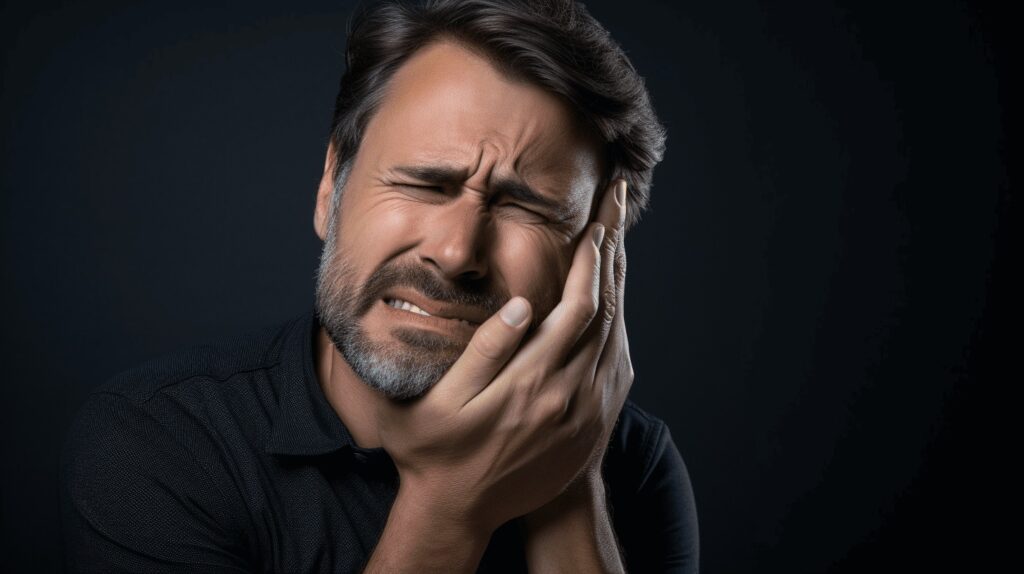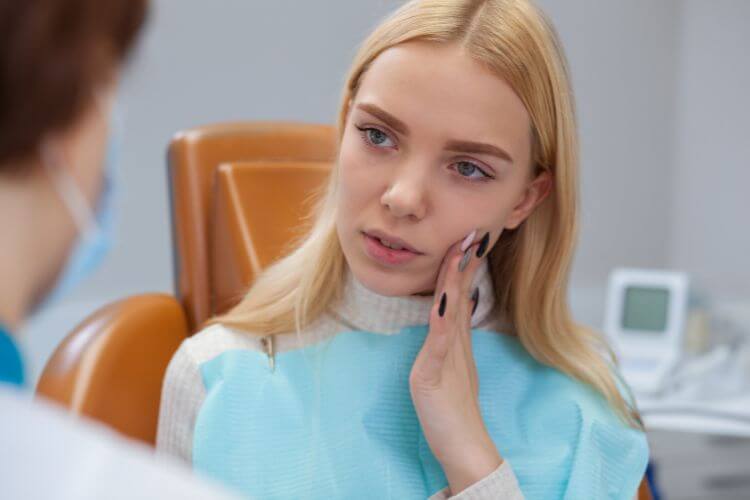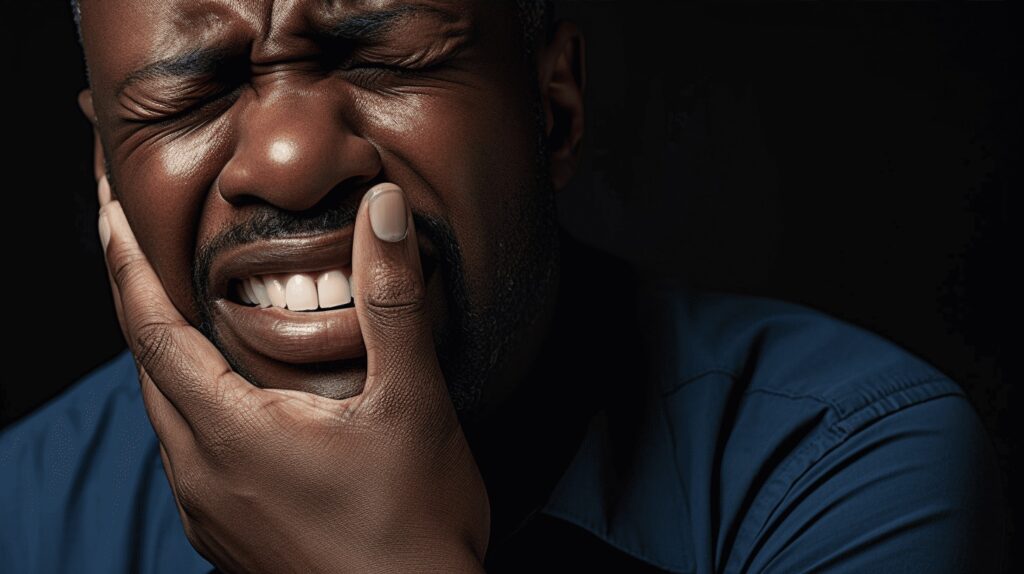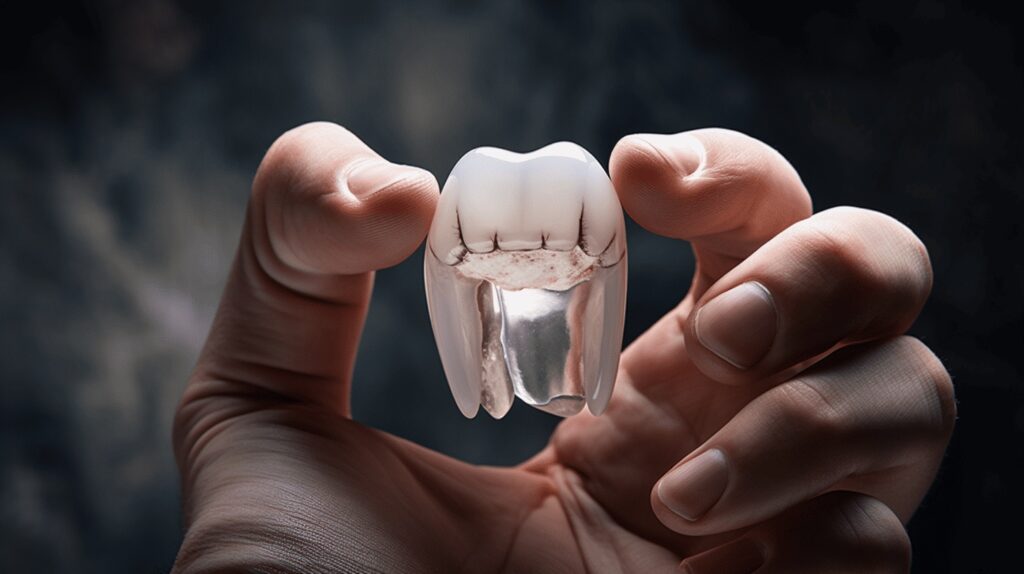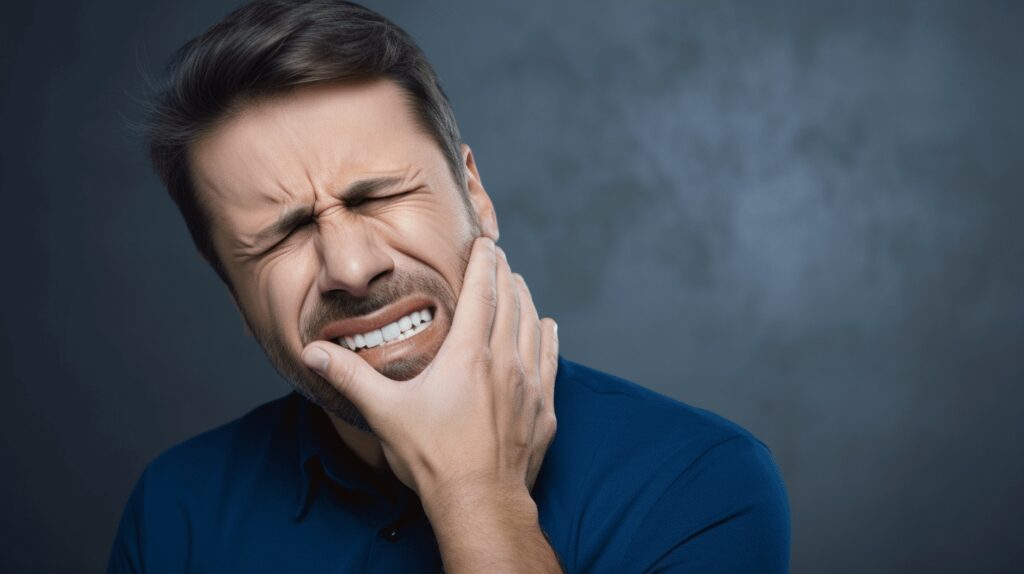Imagine being in the midst of an exhilarating hike or savoring your favorite caramel popcorn during a movie night when, all of a sudden, crippling tooth pain strikes or a tooth gets knocked out. Bummer, right? Every year, countless people experience dental emergencies that require immediate attention.
In this comprehensive guide, we’ll provide you with the essential information about emergency dental care. Whether it’s what qualifies as a dental emergency, recognizing the tell-tale signs, first aid steps to take, or understanding when to contact an emergency dentist promptly, we’ve got you covered. So, buckle up and join us as we navigate the path to saving smiles around the world!
Table of Contents
Common Dental Emergencies
Living our day-to-day life, it’s not uncommon to encounter hiccups and have accidents. But when these mishaps involve our teeth, it becomes a cause for immediate concern. Dental emergencies can happen anytime, anywhere, and it’s crucial to be knowledgeable about the common maladies that may occur. Fortunately, with the right information, we can deal with these situations promptly and effectively.
Knocked-Out Tooth
Imagine you’re having a post-work soccer match with friends, and everyone’s pumped up. While it might be fun to battle it out, the sport doesn’t come without its risks. We’ve all witnessed instances where a sudden ball to the face results in a knocked-out tooth. 😱
It’s a startling experience, but you can manage it by:
- Picking up the tooth by the crown, not the root, ensuring it doesn’t get dirty.
- Gently rinsing the tooth if it’s dirty. Water is the best option; avoid cleaning materials, as they may damage the tooth.
- Attempting to place the tooth back in its socket.
- If that isn’t possible, keep it in a container of milk or saliva until you reach the dentist.
Severe Toothache
A toothache can be a real pain. No, literally! It’s something virtually everyone will experience at least once in their life.
To manage a severe toothache, try the following:
- Rinse your mouth thoroughly with warm water.
- Gently use dental floss to remove any food particles that may be caught between teeth.
- If you notice any swelling, a cold compress may help.
However, severe toothache indicates the need for immediate dental attention.
Broken or Chipped Tooth
Now, savoring that caramel popcorn at the cinema seemed fun until you felt that sudden, sharp tooth pain. You’ve chipped or broken a tooth.
You can manage this by:
- Rinsing your mouth with warm water.
- Using a cold pack on the cheek to reduce swelling if any.
- Applying gauze to the area for about 10 minutes if there’s any bleeding.
- Taking a painkiller that doesn’t require a prescription.
Lost Dental Filling or Crown
The crowning glory to a sumptuous meal turned into a nightmare when your dental crown fell out, or your filling came loose.
To handle this, you could:
- Apply a little clove oil on the sensitive area. Use a cotton swab for application.
- If you’re able, slip the crown back over the tooth. Before doing so, you can coat the inner surface with an over-the-counter dental cement, toothpaste, or denture adhesive.
- Save the loose filling and bring it to your dentist.
Remember, these tactics are mere temporary solutions. None of them replace the need for a dentist. At the end of the day, make sure to get professional dental help urgently to avoid any lasting consequences. 👊💥
So there you have it, folks. Information is your best weapon when it comes to dealing with common dental emergencies. It’s always wise to be prepared, have a plan, and know your next steps to ensure your pearly whites stay in top condition. 😷😁
Above all, remember this – Dentally speaking, prevention is better than cure!
Signs that Indicate Immediate Dental Care
No one enjoys a trip to the dentist; the mere thought of a drill whirring away close to our pearly whites is enough for us to shudder. 😖 However, as much as we may not relish these visits, there are situations where it’s critical to set aside our fears and contact a healthcare professional.
In this section, let the spotlight shine on the telltale signs that might warrant immediate dental care. We’ve got your back, helping you understand when a toothache is more than just a minor inconvenience.🦷
Bleeding
Never ignore bleeding gums; it’s not normal for your gum line to bleed, even while brushing, flossing, or after eating something hard. Persistent or excessive bleeding may be a sign of something more serious such as periodontal disease. Your gums are essentially the foundations of your precious dental structures. Protect them at all costs! Here’s a breakdown of the symptoms related to bleeding:
- Regular occurrence while eating or brushing
- Visible redness along the gum line
- Gums feeling tender to touch
Swelling
Swelling is another sign that something is not right. Usually, swelling is our body’s inflammatory response to an infection. When it occurs in your mouth, jaws, or around your face, it may be due to:
- Dental abscess
- Gum disease
- Wisdom teeth problems
And while an ice pack might take down the swelling, it doesn’t treat the underlying issue. Persistent swelling should never be ignored; instead, get in touch with your dentist right away! 🚨
Severe Pain
Sure, there are those moments when we all feel a twinge of toothache feed. Maybe we drank something a bit too cold, or went a bit overboard with the sugary sweets. However, severe or persistent pain (lasting more than a day or two) isn’t normal and might be the sign of:
- Cavities: Hole formations that have reached deep into your tooth
- Cracked tooth: Breach in your tooth’s structure
- Abscess: An accumulation of pus due to an infection
In these cases, don’t try to be your own dentist – reach out to a professional immediately!
Remember, if you don’t look after your oral health, it can impact other areas of your body and overall well-being. So, no matter how much you fear that dentist’s chair, don’t neglect these potential signs of a dental problem. Your healthy, gleaming smile is worth the effort! 😄
First Aid Tips for Dental Emergencies
Ever been faced with a dental emergency, an unexpected toothache, or even worse, a knocked-out tooth? 🙊We understand the panic and chaos these situations may initially cause. But don’t worry, we’re here to guide you through the best first aid procedures to follow when these dental mishaps happen.
Knocked-Out Tooth
A knocked-out tooth may occur from a casual sports accident or even from a clumsy tumble. The first thing to do – stay calm.
- Hold the tooth from the crown (the part that’s visible in your mouth) and not its root (the part that stays hidden inside the gum).
- Rinse the tooth gently with clean, lukewarm water. No soap, no scrubbing, and no drying.
- If possible, try to reposition it back into the socket.
If it doesn’t fit back in, immerse it in a container of milk or place it inside your mouth, next to your cheek, to keep it moist. It’s important not to let it dry out. These actions can significantly impact your dentist’s ability to put it back later on.
Severe Toothache
A persistent toothache is genuinely unpleasant.😫 A couple of comfort measures can help you while you arrange an appointment with your dentist:
- Rinse your mouth with warm water.
- Use dental floss to remove any lodged food.
- You could apply a cold compress on the outside of the affected area.
- Over-the-counter painkillers can be used. However, avoid applying aspirin directly on the tooth or gum, as this might burn the tissue.
Broken or Chipped Tooth
If you have broken or chipped your tooth, here’s what you can do:
- Rinally rinse your mouth with warm water.
- Apply a cold compress on the affected side of the face to minimize swelling.
- Over-the-counter dental cement can temporarily cover the chipped area.
Lost Dental Filling or Crown
If you’ve lost a filling or crown, don’t panic. Here’s how to proceed:
- If possible, save the crown or filling.
- Apply over-the-counter dental cement, toothpaste, or denture adhesive to the tooth surface. This temporary solution can protect your tooth until you’re able to see a dentist.
Remember, these are only first aid measures. They are not long-term solutions and should not replace seeing a dentist. In all the above scenarios, make sure to contact your dentist as soon as possible. Making your dental health a priority is not just about ensuring a great smile, but it’s also critical for overall health and happiness. 😁
Prevention and Preparedness for Dental Emergencies
Dental emergencies can happen at any time, anywhere and to anyone. The sudden pain of a toothache, a cracked tooth, or bleeding gums can be enough to ruin your whole day. But don’t fret! 💪 By taking some simple and practical measures, you can effectively prevent most dental emergencies or at least minimize their impact. Here are some key steps to consider:
Regular Dental Check-ups
One of the most effective things you can do to prevent dental emergencies is to regularly visit your dentist. A routine dental examination lets your dentist identify and resolve potential issues before they escalate into emergencies.
- Reviews: Your dentist will consistently monitor your oral health by inspecting for signs of dental diseases and conditions.
- Early detection and treatment: Regular check-ups facilitate early detection of tooth decay, gum diseases, or oral cancers which can be successfully treated if caught early!
- Guidance: Your dentist can provide expert advice on oral health habits, diet, and lifestyle changes to prevent common dental problems.
💡 Remember, an ounce of prevention is worth a pound of cure.
Maintaining Good Oral Hygiene
Keeping your teeth and gums clean plays a vital role in preventing dental emergencies. Good oral hygiene isn’t just about having a white, dazzling smile! It’s also about keeping bad bacteria and destructive diseases at bay.
- Brushing: Brush your teeth twice daily using a fluoride toothpaste. This helps to prevent tooth decay and gum disease, the leading causes of tooth loss.
- Flossing: Brushing alone isn’t enough. Make flossing a part of your daily routine. It helps remove plaque build-up in hard-to-reach areas between your teeth.
- Balanced diet: Sugary and acidic foods can be damaging to your teeth. On the other hand, a balanced diet rich in calcium, vitamin D, vitamin C, and other nutrients can support your oral health.
😊 Surprisingly, simple oral hygiene habits can go a long way in maintaining dental health!
Wearing Mouthguards
If you engage in sports or other physical activities with a high risk of injury, wearing a mouthguard is an essential precaution. A mouthguard is a protective device that covers the teeth and gums to prevent injury.
- Protection: A mouthguard can prevent chipped, broken, and knocked-out teeth, as well as mouth lacerations and damaged braces.
- Custom-fit: Consider getting a professionally made, custom-fit mouthguard. They present superior comfort, protection, and durability than generic brands.
🏈 No matter the sport, a mouthguard should definitely be part of your gear!
In conclusion, prevention and preparedness are your best allies when it comes to avoiding dental emergencies. Just like taking care of your overall health, tooth care requires good habits, regular check-ups, and a bit of discipline. Show your smile some love by implementing these preventative measures! 🦷
When to Contact an Emergency Dentist
Are you ever been woken up in the middle of the night due to an excruciating toothache? Or perhaps you’ve had an accidental blow to your mouth, causing a broken or dislodged tooth? 🤔 Dental emergencies can occur at the most inconvenient times. In such instances, trying to discern between a general dental issue and an urgent emergency can be challenging. This article will provide some clear guidelines on when it becomes absolutely necessary to get an emergency dentist involved and what situations are manageable with basic home remedies or at a later appointment.
After-Hours Emergencies
Even dentists need their beauty sleep 🛌, but what happens when you face a dental crisis after typical office hours? Not all situations qualify as an emergency that can’t wait until the next day. So, here’s a quick list to help you identify if you need immediate after-hours dental attention:
- You’ve lost a tooth. Time is of the essence in these cases; you must take action within the first hour.
- Severe and unbearable toothache.
- Swelling of gums, pain, or pimple-like bumps, indicating an abscess.
Injuries to the Jaw or Face
One of the most obvious signs that call for an emergency dentist is when you experience an injury impacting your jaw or face. This can involve personal accidents or sports injuries. Such situations can lead to broken teeth, jaw misalignment, or even worse, damage to the nerves and blood vessels in your mouth. 🤕
- Fractured or dislodged teeth due to sudden impact.
- Damage to your tongue, cheeks, or lips causing severe bleeding.
- Trouble with normal jaw movement, indicating potential fractures or dislocations.
Severe Dental Pain
A toothache can be a real downer, but when does a simple toothache cross the line into the realm of severe dental pain? 🦷 Here are a few pointers to assist you:
- Persistent and sharp toothache that disturbs your sleep, work, or daily activities.
- Hot or cold sensitivity lasting more than 15-20 minutes.
- Pain in or around your ears, leading to headaches or migraines.
It’s essential to remember that an emergency dentist is not a permanent alternative to regular dental care or good oral hygiene habits. They are merely options for unexpected dire situations. So, keep up your daily teeth cleaning regime and not let minor issues transform into major dental emergencies!
Conclusion
Dental emergencies can strike at any time and it’s crucial to know what to do when they occur. Acting promptly and correctly can make the difference between saving or losing a tooth. Moreover, it’s worth noting that preventative action, including regular dental check-ups and good oral hygiene, can help avoid many dental emergencies.
At Wilshire Smile Studio, we believe in being there for our patients when they need us the most. We take pride in our comprehensive range of dental services and our commitment to patient comfort, safety, and care. Whether it’s a routine check-up, a detailed cosmetic treatment, or urgent emergency dental care, our skilled team caters to your specific needs to ensure a great dental experience. And no matter the situation, remember that our experienced dentists are equipped to help you through it.
After all, your relentless smile is our ultimate reward!
Call Wilshire Smile Studio at (323) DEN-TIST now or book online to set up an appointment for a full dental examination and to discuss your best options.
Frequently Asked Questions
1.What are some common dental emergencies that require immediate treatment?
Common dental emergencies that require immediate treatment include severe toothaches, knocked out or broken teeth, jaw fractures, severe gum infections, and loose or lost dental fillings or crowns.
2. What should I do if I have a dental emergency after regular office hours?
If you have a dental emergency after regular office hours, you should contact an emergency dentist or visit the nearest emergency room. They will be able to provide the necessary immediate treatment and relief.
3. Is it necessary to visit the emergency dentist for a minor toothache?
For a minor toothache, it may not be necessary to visit the emergency dentist immediately. However, if the pain persists, worsens, or is accompanied by swelling or fever, it is best to seek professional help as it may indicate a more serious underlying issue.
4. What should I do if a tooth gets knocked out?
If a tooth gets knocked out, try to gently place it back into the socket without touching the root. If this is not possible, keep the tooth moist by placing it in milk or saliva and seek immediate dental care. Time is crucial for successful re-implantation of a knocked-out tooth.
5. Can I prevent dental emergencies?
While not all dental emergencies can be prevented, you can minimize the risk by practicing good oral hygiene, wearing mouthguards during sports activities, avoiding chewing on hard objects, and visiting your dentist regularly for check-ups and cleanings.


